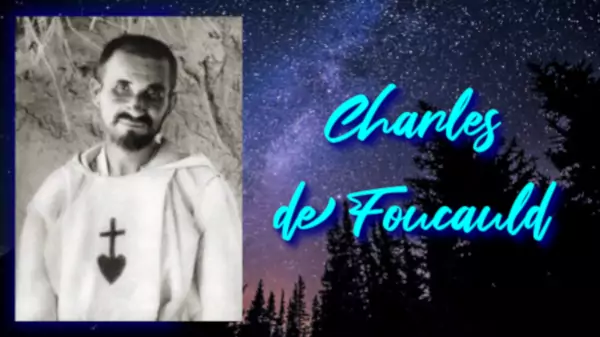December 1 - Charles Eugène de Foucauld de Pontbriand, was born in Strasbourg on September 15, 1858. Second son of Élisabeth Beaudet de Morlet and Édouard de Foucauld de Pontbriand, forest inspector. His eldest son died at the age of one month.
His parents, famous figures of the kingdom, were his father from Périgord and his mother from Lorraine. He was baptized on November 4, 1858, in the church of Saint-Pierre-le-Jeune, and was brought up by his mother, Elisabeth, in the Christian faith, through acts of piety. Elisabeth, Charles' mother, had a miscarriage which led to his death on March 13, 1864. Her father, a few months later, died on August 9 from neurasthenia. Charles was only six years old at the time. His grandparents raised him and his younger sister. When they died, they were raised by their aunt. It should be noted that Charles attended primary and elementary school in Strasbourg and then continued his education in Nancy. On April 28, 1872, he received his First Communion and the Sacrament of Confirmation from Bishop Joseph-Alfred Foulon. As he grew in knowledge, he distanced himself from the faith and became selfish. When Charles obtained his baccalaureate on August 12, 1874, he was sent to Versailles, at Sainte-Genève, to prepare for entrance to the military school of Saint-Cyr. He didn't like the rules of the boarding school, and he completely abandoned religion. He received his second baccalaureate in 1875. He was expelled from school for laziness and indiscipline and returned to Nancy. A year later he entered Saint-Cyr, and when he reached the age of eighteen, his possessions were transferred to him and he lived in luxury, the least we can say is that Charles fell into debauchery. At twenty-three, he decided to leave Saint-Cyr and go exploring in Morocco, where he passed himself off as a Jew. He received a gold medal for his research and in 1888 he published a book entitled "Reconnaissance in Morocco".
When Charles de Foucauld returned to France and met many priests and people, he repented and rediscovered the Christian faith, and joined the Trappists on January 16, 1890. Wishing to live poverty and penance, he left the Trappists and lived as a hermit in 1091. He lived in Palestine and wrote many prayers and meditations, including the famous "Prayer of Abandonment". It should be noted that Charles de Foucauld was ordained a priest at Viviers on June 9, 1901 and returned to the Sahara at Béni-Abbés in the Algerian desert. There he created a new order and preached by example. He studied Tuareg culture and for twelve years he wrote a dictionary in Tuareg and French. This work by Charles de Foucauld is one of the best known works on Tuareg cultural research. Charles accepted the Gospel with sincerity. Preaching the Gospel, without forcing others, he bore witness to Jesus with respect for other religions, and taught the primacy of love to live in communities. On December 1, 1916, Charles de Foucauld was murdered at the door of his home. He was soon considered a saint and many worshipped him. Many organizations also took his writings and his example of life for spirituality. It was in 1927 that the process for his beatification began. It was temporarily suspended during the Algerian war and then resumed later. On April 24, 2001, Pope John Paul II approved the decree of heroicity of the virtues of Father de Foucauld, who thus became venerable. Charles de Foucauld was beatified by Pope Benedict XVI on November 13, 2005.








